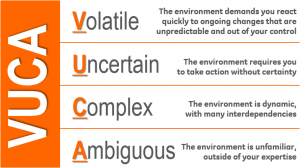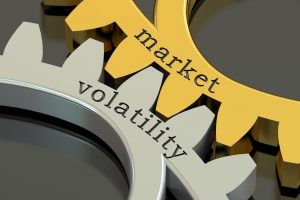VUCA is the acronym is used to describe the state of business, political, societal and ecological world. VUCA acronym stands for Volatility, Uncertainty, Complexity and Ambiguity. The world is experiencing a crazy spin of events because too many uncertainties have plagued the world. These days you don’t see linear organisations, they hardly exist. Most organizations exist by adapting complexities and by behaving resilient. We see new trends in organizational structures seemingly evolving as fast as they can be identified. So for those enterprises operating in multiple geographies, it is essential to assess how the diverse cultures of the regions in which they do business affect their organizational structure.
World Has Become Volatile: Volatility is ever increasing. Brexit is a good example of VUCA world. Britain’s exit from the European Union took the world by surprise. A consequence of this political factor has affected economics, commerce, regulatory system and emotional perception of people at large. The British leaves alone isolated from their major trading partners, i.e the Euro Zone. That is surely not a healthy thing for world trade. The real shocks are yet to be faced. After Brexit, political and security effects would be more important to the US. The potential economic gains and losses for the U.S in Brexit are small, apart from the TTIP-like arrangement which would result in substantial economic gains for the US. The US will miss the influence and global perspective that the UK brings to the EU decision-making process, particularly around foreign policy, security and defence. TTIP (T-Tip) is a planned agreement focused on lowering trade tariffs and removing costly regulations on business across the Atlantic. These barriers include labour rights, food safety rules and banking safeguards put into place following the recession.
Syria’s war shows no sign of stopping. Syria can be described as several interconnected wars. It’s not the government-versus-rebels narrative it started out as in 2011. In the last few weeks, the proxy conflicts between Israel and Iran and Turkey and the Kurds have heated up in particular.
US’s pressure on Turkey to deal with Isis will actually make Turkey more vulnerable to attack from the terrorist group. Brazil is unable to address its growing fiscal deficit, the war between North Korea and South Korea, the political instability in many parts of world has increased the volatility in world. The geographical, political, ecological, economical changes are too much of burden on the business organizations.
Uncertainty everywhere: Uncertainty is linked to volatility. Business organizations are reworking on their decision making frameworks in which decisions can be executed. Management techniques were always based on assumptions about the future and the use of planning is a major tool of management control. Change is constant, products are living a shorter life span, to top it all, political and economical events are spinning the decision making of business managers like never before. Planning, budgeting and control methods lead to never-ending discussions in company board rooms; it just doesn’t reach any logical conclusion. Once again, just look at Brexit again. Everyone knew that the “leave” decision of voters had a 50% chance of occurrence but a few hours later the consequences of it were nevertheless still hard to predict.
Mergers, acquisitions and takeovers have reached a peak globally because firms are seeking to reposition themselves and protect profitability in the face of shifting customer demands, rising regulation and the need to embrace technology.
Complexities are only mounting: Globalisation has pushed the boundaries of doing business, which has only created a wide gap between developed and underdeveloped markets, increasing the competition from new entrants. Globalization has put pressure on businesses of all sizes to tap international customer base. From a technology point of view, s businesses need to review all processes and see how their legacy and systems can cope with training of staff, multi-lingual customers, foreign compliance and a whole host of other intricate and very time-consuming changes. The biggest fact today is the start-ups are giving competition to established businesses in many sectors, the bigger and established players are dumbfound due to ac of creativity and innovation. Organizations today need 24X7 innovative pool of employees, those who can just keep innovation pumping at all levels of business. And, another fact is however innovative people get information technology takes its own time to change. This means that businesses have become too reliant on their expensive legacy systems, restricting innovation as a result.
Ambiguity cannot be wiped out: Too much of information keeps pouring in from everywhere, and the media keeps people on their heels. Customers are having large information, they are confused about what to buy, how to buy, from where to buy, at what price to buy…. Everything has become complex: pricing, operations, R&D, firm’s infrastructure, supply chains, customers’ behaviors, big data systems, economic models, finances everything is challenging. Due to random organizational structures, the authority and responsibility lines grow blurred, which creates a big leadership challenge. Due to blurring responsibilities of managers, internal complexities keep growing in organization. Employees get busy playing the blame game and politicising the work atmosphere. The same is with Governments, blurring responsibilities gives way to non transparency in systems. Globalization has paved way for a growing number of multi-channels with customers, each with their own set of priorities and responsibilities. At the Government level, organizational level, channels level and customer level haziness exists.
Conclusion: One of the main challenges of today’s business scenario is to accommodate inconsistencies in (PESTLE) Political, Economical, Social, Technological, Legal and Environmental constituents. The complexity of today, demands managers to act by taking into account the complete picture, they should understand that pure statistical data cannot suffice for decision making. They should get ready for implications when wrong decisions are made, volatility and ambiguity in markets can lead in making wrong decisions. They should learn to accommodate the extremes; the dichotomy of good, bad, right, wrong desirable and undesirable does not exist any longer.
On a personal level employees must be tolerant to ambiguity and volatility by taking care of their mental and physical health, they must practice critical thinking and risk acceptance. VUCA World is here to stay.















































